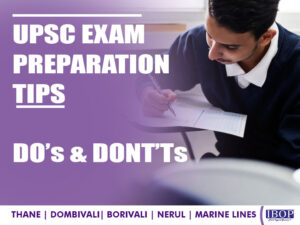Do’s And Don’ts for UPSC – Civil Services Exam Preparation

“What not to do is more important than What to do” – A discussion on Civil Services Exam preparation has an array of variation. Every third UPSC aspirant is confuse about something related to his/ her preparation… At the same time there are a lot of people who can give you a big list of suggestions related to the UPSC / IAS exam.
So here are some Do’s and Don’ts to follow for a successful UPSC preparation:
DO’s
Make a proper study plan
First thing first. It is very essential for UPSC candidates to have a proper plan to cover the vast syllabus. Candidates should prepare advance short-term and long-term study plans accordingly.
Solve Question papers As Much as possible
Solve previous years UPSC question papers, practice papers, and take mock tests as much as possible. It will help you to understand the UPSC exam pattern and manage your time better.
Choose Optional subjects you’re comfortable with
Choosing the optional subject is a complicated decision. So, try to select them considering factors like educational background, interests, and level of comfort.
Give special attention to Current Affairs
Read newspapers, news blogs and general books for updating knowledge on current affairs. It will enhance your reading and writing skills too. For better preparation, it is advisable to enrol into a good caoching centre.
Balance Time between all the subjects
Time management is very important in all exam preparation. You should learn to balance time to prepare all the subjects (topics, sections, and stages) equally of the exam.
Enrol into the best coaching centre for UPSC exams.
Self-study is recommended but when you’re preparing for India’s top services, you must need the right mentors, guidance and tricks. Therefore, choosing the right and best coaching centre for UPSC Examination preparation is very important.
Read from fewer books, materials but revise more
Follow a few standard textbooks for your optional subject as well as the static portions of general studies (GS). A serious aspirant should, however, aim for multiple revisions of the material. After one or two readings, check the Mains questions from previous years and try to frame their answers in your mind. Practise writing a few answers within the given word and time limits. This will help you in developing the ability to frame your answers during the main exams.
Attempt all questions in the Mains exam
Candidates should aim at attempting all questions in the Mains exams. This is of vital importance. Missing out on a couple of questions could as well mean missing out from the “cut-off” list. Start writing immediately after the time starts, making sure that you understand the demands of the question.
Write clear and to the point answers
Your answers should be clear, relevant and to the point. The ability to understand and analyze the issue at hand from various angles, express it coherently in concise language and be able to offer constructive suggestions wherever required is what will make your answers stand out. You should also try to link your answers with the current developments related to the topic.
DONT’s
Do not ignore the syllabus
UPSC candidates should stick to the UPSC syllabus and complete it first as every year most of the questions are based on the given syllabus. Also, you shouldn’t ignore NCERT textbooks, as there are some questions based on fundamentals too.
Don’t consider too many materials
Avoid buying or collecting too many materials to study. This will be a waste of time. Instead, focus on learning and understanding important issues and events that have a hold on various topics.
Don’t think any topic lesser than others
Few aspirants focus only on all General Studies papers and leave optional and vice versa for others. Don’t do that, instead have a balanced approach for all the papers.
Don’t overdo
You should not overstudy, it will badly affect your overall preparation. Instead, take breaks, relax and spend some quality time on things you like to do.
Don’t go for too many books/sources
Going for many books and sources is a common mistake that aspirants make. They do so in the hope that their knowledge will be richer by referring to various sources. However, it would be very difficult to revise these multiple sources before the exam. And it can be safely said, at least for the civil services exam, that not having revised a topic is akin to not having studied it at all.
This journey of UPSC preparation has a limited time period, which you should be ready to utilize the best of it.
For more Information Speak To Our UPSC Expert & Book Your Demo Lecture Today.
Request to Call Back :







